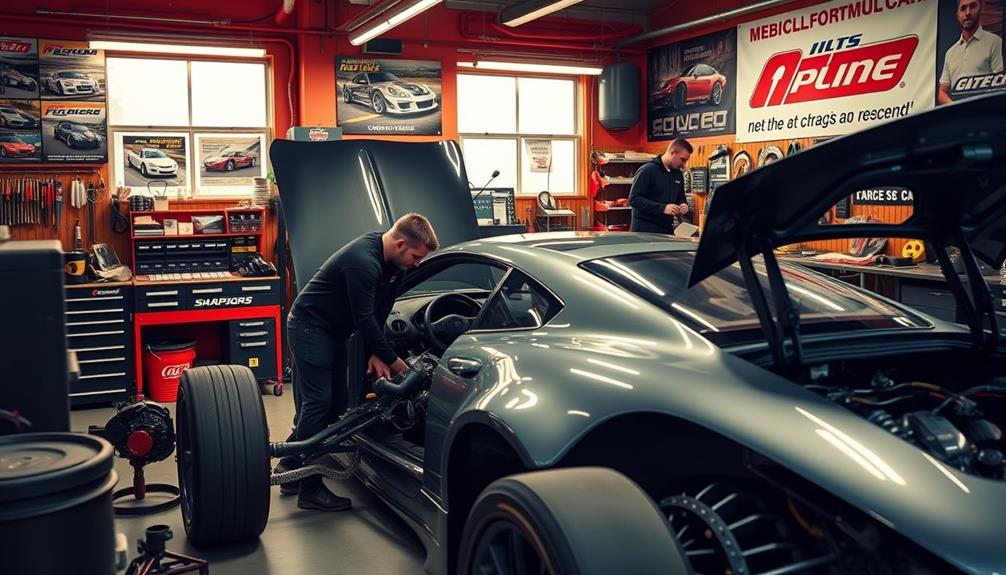To start a career in car tuning, first, assess your passion by getting involved with vehicles and the tuning community. Gain practical experience by tuning your own or friends' cars and consider volunteering at local tuning shops. Look for educational resources like courses or online tutorials to sharpen your skills. Building a professional network is essential, so connect with other enthusiasts and attend automotive events. Understanding the industry and continuously honing your skills will set you apart. You'll discover tips for marketing your services and maneuvering challenges that can boost your success as you continue exploring this exciting field. To further your career in car tuning, consider creating a car tuning specialist career roadmap by setting specific goals and milestones. This could include obtaining certifications or gaining hands-on experience at reputable tuning shops. Additionally, staying updated on the latest industry trends and technologies will help you stay competitive and continue to grow in your career as a car tuning specialist. Remember to always seek feedback and learn from experienced professionals in the field to continuously improve your skills and expand your knowledge.
Key Takeaways
- Assess your passion for tuning by engaging with cars and joining local clubs to immerse yourself in the community.
- Gain practical experience by tuning vehicles, volunteering at shops, and participating in personal projects to build your skills.
- Utilize educational resources like trade schools, online courses, and webinars to enhance your knowledge of tuning principles.
- Build a professional network by attending automotive events, joining clubs, and connecting with industry professionals for mentorship opportunities.
- Market your services through a strong online presence, social media engagement, and showcasing your work to attract clients and build reputation.
Assessing Your Passion for Tuning
When diving into a career in car tuning, it's crucial to assess your passion for the craft. Start by evaluating your long-standing interest in cars and motorsport. If you find yourself daydreaming about automotive careers since childhood, you're likely on the right path.
Engaging in hands-on experiences, like working on your own car or helping friends with theirs, can confirm your enthusiasm and skill level in tuning.
Join local car clubs or attend tuning events to immerse yourself in the community, gaining insight into the lifestyle and industry. This involvement can help gauge your commitment to a tuning career.
Additionally, stay informed about the evolution of the automotive industry, especially the shift toward electric vehicles. Understanding these trends guarantees your passion for tuning remains viable long-term.
Gaining Practical Experience

To kickstart your journey in car tuning, gaining practical experience is essential. Here are some effective ways to immerse yourself in the automotive business and enhance your skills:
- Tuning Personal or Friends' Cars: Start by applying your theoretical knowledge to real-world scenarios. This hands-on experience is invaluable and helps you understand the nuances of tuning.
- Volunteer or Intern at Tuning Shops: Seek opportunities at local tuning shops. This exposure to professional practices and techniques will greatly enhance your skill set and understanding of the industry.
- Offer Free Tuning Services: Initially, provide your services for free. This approach helps you build a reputation and showcases your abilities, which can lead to paid opportunities down the line.
- Engage in Community Forums: Join automotive groups and online forums to connect with experienced tuners. They can offer mentorship and collaborative learning experiences, further enriching your practical knowledge.
Educational Resources and Courses
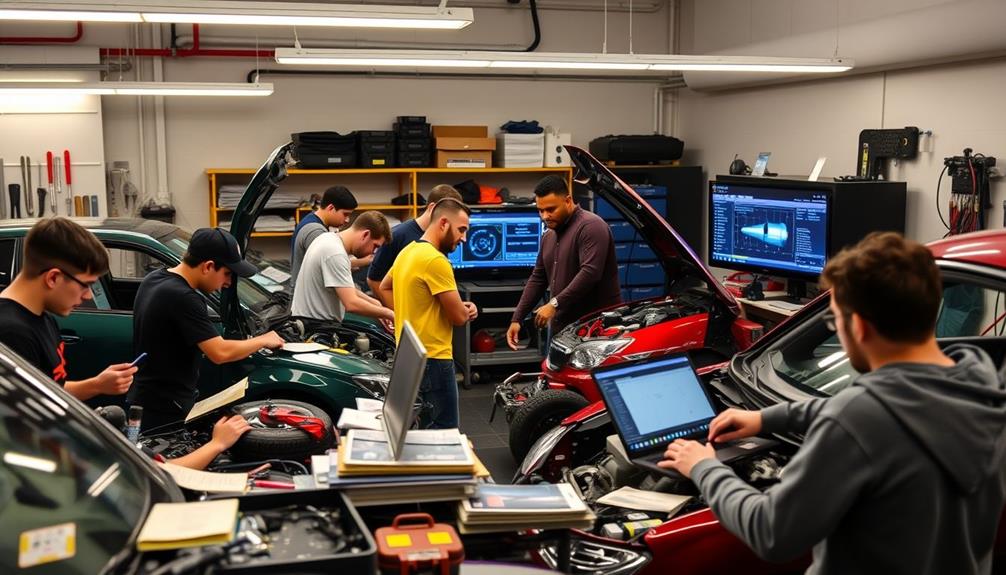
Practical experience lays a solid foundation for your car tuning career, but complementing that with formal education can elevate your skills even further. Numerous educational resources are available to help you sharpen your tuning expertise. Local trade schools often offer Automotive Technology programs, which provide essential knowledge in car mechanics and tuning principles.
Additionally, online platforms feature a variety of free content, webinars, and paid courses, allowing you to explore core tuning concepts at your own pace. Many successful tuners emphasize the importance of hands-on experience, urging you to engage in personal projects or volunteer at tuning shops for invaluable practical application.
Here's a quick overview of some educational resources you might consider:
| Type of Resource | Description |
|---|---|
| Trade Schools | In-person Automotive Technology programs for foundational skills. |
| Online Courses | Paid and free courses covering tuning principles. |
| Webinars | Expert-led discussions on specific tuning topics. |
| YouTube Tutorials | Free video content for hands-on learning. |
| Community Forums | Peer support and advice from fellow enthusiasts. |
Staying updated with continuous education is essential in the evolving automotive industry, ensuring you remain on the cutting edge of tuning techniques and technologies.
Building a Professional Network
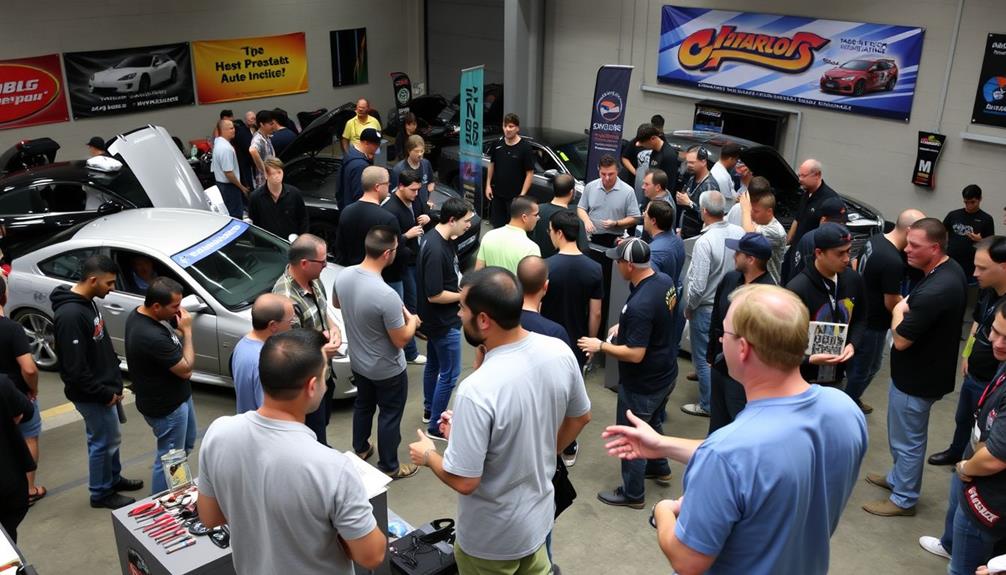
Building a professional network is essential for advancing your car tuning career, as it opens doors to new opportunities and valuable connections.
Here's how you can effectively build your network in the automotive world:
1. Join Tuning Clubs: Connect with local tuning clubs or automotive enthusiast groups.
You'll meet like-minded individuals and potential clients looking for tuning services.
2. Attend Automotive Events: Participate in car shows and track days.
These events are great for showcasing your skills and meeting industry professionals who can help you grow your career.
3. Volunteer: Offer your time at local tuning shops or race teams.
This not only boosts your visibility in the community but also provides hands-on experience and mentorship opportunities.
4. Engage Online: Immerse yourself in online forums and social media groups dedicated to car tuning.
These platforms can expand your network and lead to collaborations or referrals for your services.
Understanding the Tuning Industry

Steering through the tuning industry requires a solid understanding of both the technical aspects and market dynamics. Unlike many professions, the tuning industry doesn't emphasize formal qualifications; instead, hands-on experience and practical skills take precedence.
You'll need to familiarize yourself with modern EFI systems and the complexities of vehicle electronics, as these are essential for effective ECU programming.
As demand for performance enhancement grows, especially in areas like Melbourne, the tuning market offers significant opportunities for new entrants. To capitalize on these chances, networking within the tuning community is important.
Attend local events, connect with seasoned tuners, and seek mentorship opportunities that can provide invaluable insights into the industry.
Continuous learning is another key component. Technology in the tuning industry evolves rapidly, so staying updated on new practices and innovations can set you apart from competitors.
By committing to ongoing education and practical experience, you'll not only enhance your skills but also position yourself as a knowledgeable professional in this exciting field.
Embrace these elements, and you'll be well on your way to a successful career in car tuning.
Navigating Business Challenges
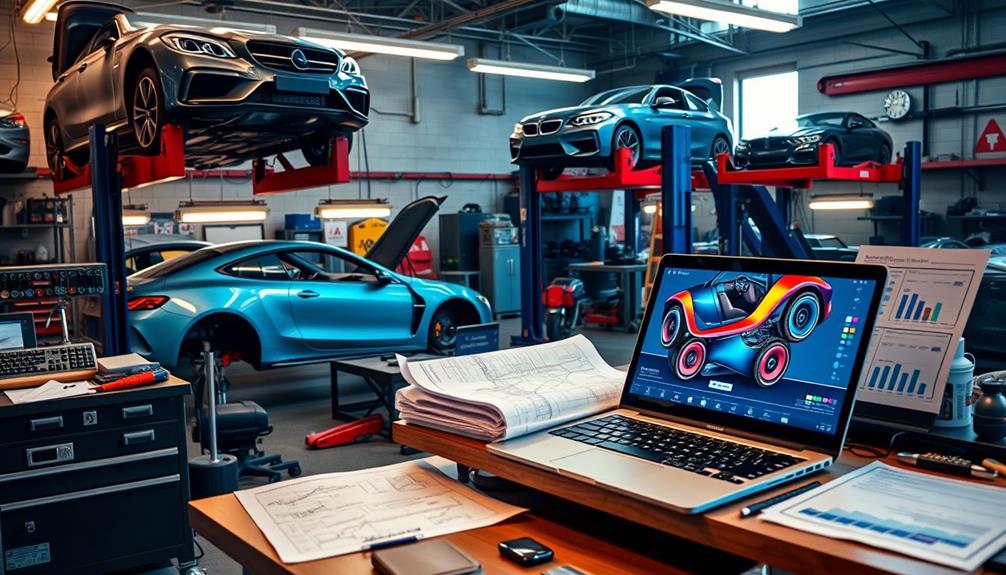
Starting a tuning business comes with its own set of challenges, and you'll need to be ready to tackle them head-on.
You'll want to focus on financial planning, ensuring you have the right budget for equipment and ongoing costs, while also understanding legal compliance to keep your business above board.
Networking with seasoned tuners can help you navigate these hurdles and set a solid foundation for success.
Overcoming Entrepreneurial Hurdles
Maneuvering the entrepreneurial landscape of car tuning can present several hurdles that you'll need to overcome. To successfully navigate these challenges, consider these key areas:
- Legal Compliance: Understand local zoning laws, insurance requirements, and liability issues. This knowledge will help you avoid potential legal complications that could derail your business.
- Financial Planning: Many new automotive businesses operate at a loss initially. It's essential to have a financial backup to sustain your operations while you build your customer base.
- Customer Base Development: Effective sales and marketing strategies are important. Focus on providing excellent customer service to guarantee client satisfaction and encourage repeat business.
- Networking: Connect with experienced tuners. Their insights into industry challenges and best practices can be indispensable as you navigate the complexities of starting your tuning business.
Balancing your passion for car tuning with the realities of running a business can be stressful.
Gradual involvement and support networks are crucial to your success, so don't hesitate to seek help when you need it.
Financial Planning Essentials
While diving into the world of car tuning can be exhilarating, effective financial planning is essential for long-term success. Start by conducting thorough market research to gauge the demand for tuning services in your area. This helps you pinpoint competitors and develop pricing strategies, informing your financial planning and setting realistic revenue goals.
Here's a simple table to illustrate the fundamental components of your financial planning:
| Category | Details | Estimated Amount |
|---|---|---|
| Startup Costs | Tools, equipment, licensing | $15,000 |
| Operational Expenses | Rent, utilities, supplies | $2,000/month |
| Projected Income | Expected monthly revenue | $5,000/month |
| Financial Buffer | 6 months of operating expenses | $12,000 |
A detailed business plan should outline these costs. Don't forget to establish a financial buffer for at least six months of operational expenses to navigate early unpredictability. Regularly track your expenses and income to adjust strategies as needed, and explore funding options like small business loans or personal investments to secure necessary capital.
Legal Compliance Requirements
Once you've laid the groundwork for your financial planning, it's time to tackle the legal compliance requirements necessary for your car tuning business. Making sure you adhere to local laws is essential for your success and longevity in the industry.
Here are some key areas to focus on:
- Business Licenses: Obtain all necessary permits, including a general business license, sales tax permit, and any automotive service certifications required by your jurisdiction.
- Zoning Laws: Research and comply with local zoning regulations to make sure your tuning shop operates in a legally designated area for automotive services.
- Insurance Coverage: Secure adequate insurance, such as liability insurance, to protect your business from potential claims and legal issues.
- Environmental Regulations: Stay informed about environmental regulations concerning emissions and waste disposal to avoid penalties and make sure compliance with local standards.
Regularly review and update your understanding of these legal compliance aspects, as regulations can change, impacting your operations.
Essential Skills for Tuners

To excel in car tuning, you need a diverse set of essential skills that blend technical knowledge and hands-on experience. A strong understanding of modern EFI (Electronic Fuel Injection) systems is fundamental, as it forms the foundation for optimizing vehicle performance.
You'll want to develop proficiency in electronics and ECU programming, which sets you apart from traditional mechanics. This skill enables you to modify and improve vehicle functionalities effectively.
Additionally, knowledge of forced induction systems, such as turbocharging and supercharging, is critical for enhancing engine power and efficiency. Familiarity with various control systems—like ignition timing and fuel mapping—is also key to achieving precise tuning results tailored to specific performance goals.
Hands-on experience is invaluable, too. Pursuing apprenticeships at tuning shops or engaging in personal projects will provide you with practical skills that are often more valued than formal qualifications.
Financial Planning for Startups

Financial Planning for Startups
Launching a successful car tuning business requires careful financial planning to navigate the complexities of startup costs. To achieve financial stability and guarantee your business thrives, follow these key steps:
1. Create a Detailed Budget: Account for all initial startup costs, including equipment, rent, insurance, and employee salaries. This budget will serve as a roadmap for your financial journey.
It's vital to include common financial terms that will help you understand your financial obligations better.
2. Research Compliance Requirements: Understand local zoning laws and permits to avoid unexpected costs that could derail your plans.
This proactive approach can save you headaches down the line, making sure that you're fully compliant and aware of all potential expenses.
3. Set Aside Operating Expenses: Aim to have three to six months' worth of operating expenses saved.
This financial buffer will help you weather uncertainties as you establish your business.
4. Explore Funding Options: Look into small business loans, grants, or even investments from family and friends.
Securing additional capital is vital for purchasing essential equipment like a dynamometer and tuning software.
The Role of Community Support

Community support plays an essential role in building a successful car tuning career. Engaging with local tuning clubs can provide you with valuable resources and networking opportunities that foster a sense of community among enthusiasts.
By volunteering at workshops or assisting with race teams, you gain hands-on experience while building trust and relationships within the tuning community. This collaborative environment echoes the importance of authenticity and existence, allowing you to explore your true potential as a tuner.
Participating in automotive forums and online communities opens doors to mentorship opportunities, allowing you to connect with seasoned tuners who can guide you through the industry's complexities. Their shared knowledge can be invaluable as you navigate your path.
Local car meets and events serve as perfect platforms for you to showcase your skills and services, enhancing your visibility and attracting potential clients within the community.
These gatherings not only highlight your talent but also enable you to collaborate with fellow enthusiasts on projects, leading to innovative ideas and solutions.
Marketing Your Tuning Services
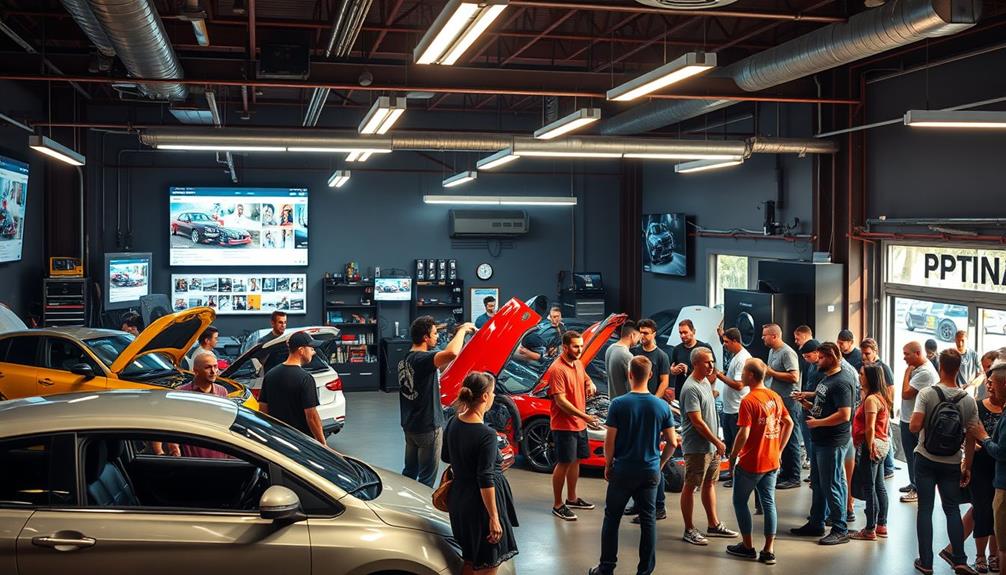
To successfully market your tuning services, you need to build a strong online presence through social media and a dedicated website.
Engaging with the automotive community at local events can also open doors for networking and showcasing your skills.
Combining these strategies will help you attract clients and establish credibility in the car tuning industry.
Building Online Presence
Building a strong online presence is essential for marketing your tuning services effectively. A well-designed website can set you apart, as 75% of consumers judge credibility based on it. Here are key strategies to enhance your online presence:
- Create a Professional Website: Showcase your tuning services, portfolio, and testimonials. Guarantee it's visually appealing and easy to navigate.
- Leverage Social Media Platforms: Use platforms like Instagram and Facebook to share before-and-after photos of your projects. Remember, visual content is 40 times more likely to be shared, increasing your reach.
- Engage with Automotive Communities: Participate in forums and online groups. With 54% of consumers influenced by these platforms, building relationships here can drive traffic to your services.
- Produce Informative Content: Write blog posts or create videos on tuning techniques and industry trends. This not only establishes you as an expert but also improves your website's SEO, attracting organic traffic.
Additionally, consider running targeted online ads on platforms like Google and Facebook. Studies show you can expect an average return of $2 for every $1 spent, making it a smart investment for your tuning business.
Networking With Enthusiasts
When it comes to marketing your tuning services, networking with enthusiasts can be a game-changer. Joining local car clubs and tuning communities not only helps you build relationships but also connects you with potential clients who may refer you to others. These connections are invaluable in a community where passion drives business.
Establishing a methodical approach to your networking efforts can also enhance your effectiveness in reaching out to fellow enthusiasts.
Participating in automotive events, like car shows and meets, gives you the chance to showcase your skills while increasing your visibility among other enthusiasts. Offering free tuning services to friends or club members is another effective way to gain practical experience and build a positive reputation; word-of-mouth travels fast in the car community.
Don't underestimate the power of online presence. Engage with forums and social media groups dedicated to car tuning to expand your reach. These platforms allow you to connect with enthusiasts actively seeking tuning services.
Additionally, collaborating with local race teams or automotive workshops can enhance your credibility and provide networking opportunities that could lead to future business prospects.
Showcasing Your Work
After establishing connections within the car tuning community, showcasing your work becomes an essential step in attracting clients and building your reputation.
To effectively market your tuning services, consider these strategies:
- Create a Portfolio: Showcase before-and-after photos of your tuning projects. This visual evidence demonstrates your skills and can be a powerful attractor for potential clients.
- Utilize Social Media: Platforms like Instagram and Facebook are perfect for sharing your success stories. Create and share content that highlights your work, engages with automotive communities, and builds a following.
- Participate in Events: Attend local car shows and tuning events. This direct interaction with enthusiasts not only promotes your services but also helps you network with potential clients.
- Offer FREE Content: Provide exclusive FREE content including live webinars, video lessons, and discounts to friends or local car clubs. This builds your reputation and generates testimonials and referrals.
Frequently Asked Questions
Do Car Tuners Make Good Money?
Yes, car tuners can make good money. With experience, you might earn between $50,000 and $100,000 annually. Specializing in high-performance vehicles or offering additional services can further increase your income potential greatly.
What Degree Do You Need to Tune Cars?
Ever wondered what degree you need to tune cars? You don't need one! Instead, focus on gaining practical experience, enrolling in automotive programs, or learning through online resources—hands-on skills matter more than formal qualifications in this industry.
Is Car Tuning a Hobby?
Yes, car tuning can definitely be a hobby. You can modify your own vehicle, experiment with upgrades, and join local clubs. It's a fun way to learn more about cars while connecting with fellow enthusiasts.
How Do You Get a Job as a Car Reviewer?
"Knowledge is power." To land a job as a car reviewer, build your automotive expertise, create an engaging online portfolio, network with industry professionals, and seek internships to gain hands-on experience and credibility.
Conclusion
In the world of car tuning, your passion can ignite into a thriving career. Like a finely tuned engine, each step you take—gaining experience, building connections, and honing skills—adds horsepower to your journey. Embrace the community around you, and let their support fuel your ambitions. With the right tools and determination, you won't just be tuning cars; you'll be crafting masterpieces on wheels. So, rev up your dreams and hit the road to success!
